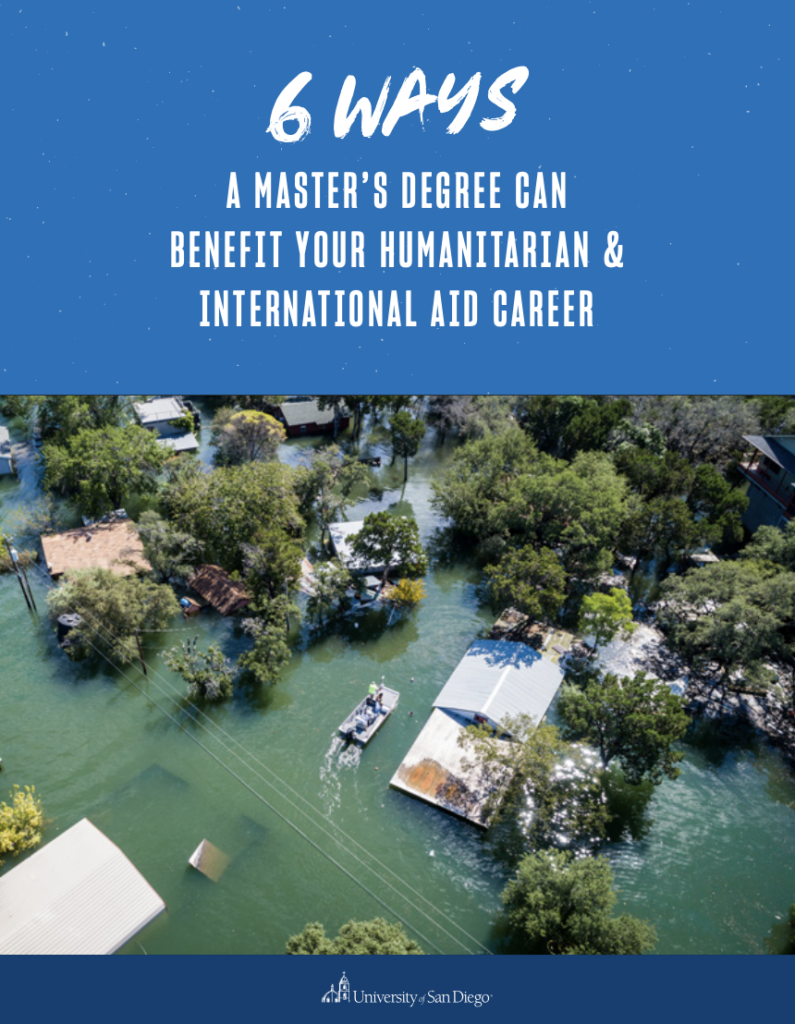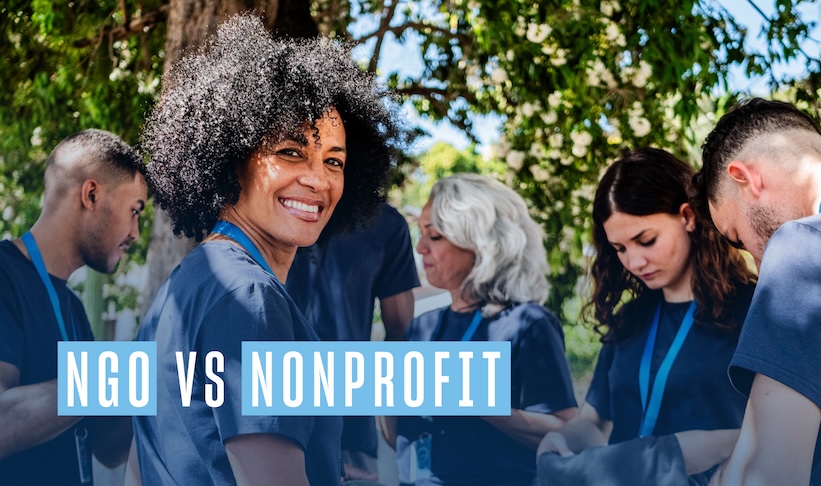In today’s interconnected world, global issues are of the highest priority, and organizations and companies continually need skilled leaders with the right education and experience to tackle worldwide challenges of human rights, disaster relief, diplomacy and humanitarian aid.
Careers in international affairs do not fall into just one category; instead, they comprise an array of roles spanning education, international law, research, public relations, disaster relief, and beyond.
This career guide will explore the details of international affairs sectors and common careers, including typical responsibilities, the type of education you may need and average compensation.
International Affairs Career Sectors
Most international affairs jobs fall within one of four sectors, though there may be some overlap depending on the position, organization or company.
| Sector | Brief Overview | Employer Examples |
|---|---|---|
| Public | All government and government-controlled enterprises. | – U.S. Department of State – U.S. Department of Defense |
| Private | Businesses and organizations owned and controlled for the purpose of making a profit. These are not run by the government. They may partner with public companies or NGOs to tackle a humanitarian problem. | – Memorial Sloan Kettering Cancer Center – Deloitte – McKinsey & Company – Amazon – Starlink |
| Non-governmental organization (NG) | A private, not-for-profit organization that functions independently of the government. | – World Vision – Save the Children – Doctors Without Borders – International Rescue Committee – Red Cross |
| Multilateral | An organization formed by at least several countries that work together on various issues. | – United Nations – World Bank – World Health Organization |
International Affairs Career List
There are many more careers than those listed below, but these are some of the most common positions you’ll find under the international affairs umbrella.
Please note that the listed salaries are averages and based on real-time data, so they may fluctuate. Your exact compensation will depend on a variety of factors, including experience, education, location, the company or organization you work for and your responsibilities.
- Diplomat or Diplomatic Agent
Diplomacy refers to the act of maintaining positive relations between groups, individuals, countries or nations. Skilled leaders who practice diplomacy are referred to as diplomats. A diplomat’s purpose is to represent the interests of their country and maintain positive relationships with other global nations and states. Additional responsibilities may include participating in peace talks, negotiating treaties and granting visas.
There isn’t one particular degree required to become a diplomat, but relevant undergraduate and graduate degrees in history, international affairs, economics, business, political science or communications will help you become successful in the field. The average salary of a diplomat is around $110,000.
- Foreign Service Officer
Similar to a diplomat, the mission of a foreign service officer (FSO) is to “promote peace, support prosperity, and protect American citizens while advancing the interests of the U.S. abroad.” Responsibilities include maintaining relationships with foreign governments and working on U.S. foreign policy. There are also specific FSO career tracks, which include consular officers, economic officers, management officers, political officers and public diplomacy officers.
There is no specific education requirement, but a degree in international affairs, political science, economics, humanitarianism, history or business management can be beneficial. The salary will depend on your experience and education.
- Foundation Program Officer
A foundation program officer often oversees the lending portfolio of foundations interested in making grants or other types of investments abroad. In addition to overseeing a foundation’s grant allocation activities, you may be involved in strategic planning, raising public awareness about your foundation’s mission and preparing reports and presentations.
To obtain this type of position, you often need a bachelor’s degree in community development, education, international relations, business, political science or a related field. Some positions may even prefer or require a master’s degree. The average salary is around $100,000 with a range between $33,500 and $155,500.
- Humanitarian Coordinator
A humanitarian coordinator assesses the need for a humanitarian response and plans, coordinates and implements as needed. Responsibilities often include identifying and prioritizing humanitarian needs, developing and implementing a strategic response plan, mobilizing resources and leading coordinator efforts.
In order to become a successful humanitarian coordinator, you will need the right combination of education and experience. An undergraduate degree in a related field, such as social work, sociology, international relations or political science is a good start, in addition to adding volunteer work to your resume. Recent undergraduates should consider an internship and/or an entry-level humanitarian position. The average salary of a humanitarian coordinator is around $73,000.
- Intelligence Specialist
An intelligence specialist typically works for the government or a closely related business or entity and will gather and analyze data intelligence that is then passed on to key officials in the form of reports and briefings. In most cases, an undergraduate degree in computer science, political science, economics or a related field is required. Many specialists also choose to obtain a master’s degree in global security, international affairs or a corresponding discipline. Salaries for this position average around $90,000.
- International Aid Worker
An international humanitarian aid provider is typically defined as someone who provides “support and relief to locations and individuals who have experienced natural disasters, war, or other developmental challenges.” Examples of international humanitarian aid provider responsibilities include organizing fundraising programs and campaigns, managing budgets, researching proposals, assessing emergency situations and helping manage logistics.
Many positions require at least a bachelor’s degree, especially those in field offices. If you want to specialize in a particular area, consider an undergraduate degree in economics, human resources, communications, environmental studies, social work, engineering or administration. The national average humanitarian aid salary is around $42,000 per year with a broad range between $18,500 and $90,000.
- International Lawyer
As an international lawyer, you may provide legal advice for victims and/or humanitarian workers, negotiate contracts, draft treaties and other legal documents and handle international disputes. Many law schools offer international law programs, which provide the foundation and knowledge for legal careers in international arbitration, foreign policy, international trade, international humanitarian law and foreign relations. A master’s degree in international policy or a humanitarian-related field could supplement your law degree. The salary range for an international lawyer in the United States is $128,000–$160,000.
- Interpreter or Translator / Cultural Liaison
Hired locally into an international organization, these people are often (but not always) local to the country and help bridge the gap between disaster response workers and the affected community. Interpreter or translator positions typically require a bachelor’s degree and must be fluent in English and at least one other language. The median salary for an interpreter or translator is around $54,000.
A cultural liaison position is similar to that of a translator but goes beyond just the language component to include expertise in a particular culture, including political, anthropological and sociological components. No matter a person’s educational background, the most important requirement for this type of position is proficiency in the appropriate languages and a deep understanding of the area’s culture. The average salary for this type of position is around $52,000.
- Nonprofit Program Coordinator
A nonprofit program coordinator is often responsible for fundraising, budgeting and community outreach efforts. They may also maintain program documentation, recruit volunteers, maintain partnerships with other organizations and help with scheduling events or workshops.
Many organizations require an undergraduate degree in social work, sociological, nonprofit management or a related field. The salary range for this position is around $59,000–$78,000.
- Policy Analyst
This type of analyst helps shape policies and strategies related to humanitarianism, including crisis response, human rights and humanitarian assistance. They conduct research and analysis and help advocate for global policy changes.
This type of position often requires a bachelor’s degree, preferably in political science, public administration, international affairs or a related field. A relevant master’s degree may also be required for certain positions. The average policy analyst salary is around $82,000.
- Political Scientist or Consultant
A political scientist or consultant studies political systems, including how they began and currently operate. They conduct research and analyze policies, monitor trends, evaluate how policies work and explore related government-related issues. To become a political scientist, you often need a master’s degree or even a Ph.D. and undergraduate course work in political science, statistics and writing. The average median pay for this type of international affairs position is $128,000.
- Public Affairs Specialist
The job of a public affairs specialist is to communicate clearly with the public and the media about particular issues, campaigns or crises. Responsibilities may include speaking to the press, organizing social media fundraising or awareness campaigns, writing press releases, coordinating interviews between the media and subject matter experts and generating content such as flyers, newsletters or emails.
A bachelor’s degree in public relations, communications or a related field is typically required with the average median pay for this type of position around $68,000.
If you’re considering a career in international affairs, you may want to supplement your education and experience with a specialized degree in humanitarianism. The University of San Diego’s 100% online Master of Science in Humanitarian Action (MSHA) degree, which is designed for both recent graduates and experienced professionals, offers an innovative, multidisciplinary curriculum that will prepare you to tackle the biggest global humanitarian emergencies.
Looking for more information on the benefits of an advanced education? Read USD’s eBook — 6 Ways a Master’s Degree Can Benefit Your Humanitarian and International Aid Career — to learn how additional education can help you take the next step in your career.




![15 Best Careers for Former Military [+How to Get Them] - black woman in military uniform sitting at a desk typing a computer](https://onlinedegrees.sandiego.edu/wp-content/uploads/2024/03/civilian-jobs-after-military.jpg)